GNV Trials RINA’s Voyage Optimization Tool Onboard GNV Polaris Vessel
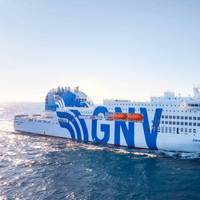
Italian shipping company GNV (Grandi Navi Veloci) has selected RINA’s SERTICA Performance for the latest addition to its fleet, the GNV Polaris, starting right away by testing the ship during its inaugural voyage from China to Italy.The tool for monitoring operational data on ships allows efficient energy consumption management and the optimization of performance.Thanks to the system, GNV has identified two optimal operating scenarios allowing for the lowest Specific Fuel Consumption…
Singapore Imports Rare Fuel Oil Cargo from Djibouti - Data
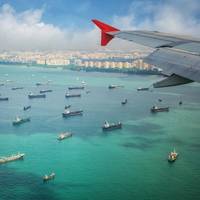
Singapore, Asia's oil hub, received a rare fuel oil cargo from Djibouti in the past week, Enterprise Singapore data showed on Thursday, likely the city-state's first ever import from the African country. About 99,678 tonnes of fuel oil that arrived in the week to May 24 came from Djibouti, the data showed. It was not immediately clear who bought or sold the cargo, or whether the cargo was produced in Africa.Ship-tracking firms Kpler, Refinitiv and Vortexa has no record of fuel oil shipped from Djibouti to Singapore. (Reuters - Reporting by Jeslyn Lerh; editing by Jason Neely)
Asia Gets Most of Russian Dark Fuels after EU Embargo
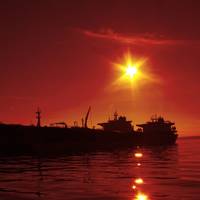
Asian countries remain the lead destinations for Russian vacuum gasoil (VGO) and fuel oil exports after the European Union's embargo, traders said and Refinitiv data showed. "Pretty stable flows for refining and bunkering", one trader said. According to Refinitiv data, China and India, which became main importers of embargoed Russian oil, were respectively accounting for about 2.6 million tonnes and 2.1 million tonnes of exports of dirty oil products from Russian ports since the start of the year…
Maritime Transport: Fuels, Emissions and Sustainability

International trade by sea has long been a key part of the world economy and approximately 90% of traded commodities is reliant on shipping. Once wind-propelled in the days of sail, the current generation of ships now heavily rely on fossil fuels. Fossil fuel propulsion contributes to global warming with carbon emissions approximating 940 MtCO2e per year and also has health implications for communities surrounding ports through the release of air pollutants. The environmental impact of fossil-fuelled engines is further compounded by their use in port infrastructure…
Tunisia, Others Work to Limit Damage after Fuel-laden Ship Sinks
Tunisia will work with other countries that have offered to help it to prevent environmental damage after a merchant ship carrying up to one thousand tonnes of oil sank in Tunisian waters, the defense ministry said on Sunday.The [Xelo] ship was heading from Equatorial Guinea to Malta when it sank seven miles off the coast of the southern city of Gabes on Friday. The Tunisian navy rescued all seven crew members following a distress call.
New Tanker Ship Design Reportedly Hits IMO 2050 Emission Targets Using Fossil Fuels
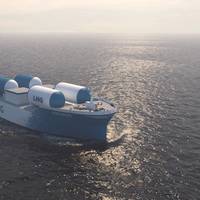
RINA issues an Approval in Principle (AiP) of Swedish designer FKAB Marine Design’s hydrogen powered MR Tanker, the first AiP of a design using currently viable technology and fuels that achieves IMO 2050 targets. Conceived by the class society and designed by FKAB, the propulsion is based on combining the ship’s fuel (LNG) with steam to produce hydrogen and CO2. The MR LNG/hydrogen-fuelled vessel is the result of a joint project with ABB and Helbio (a subsidiary of Metacon AB).“To meet CO2 reduction targets…
Third Tanker Sails from Iran Carrying Fuel for Lebanon

A third tanker has sailed from Iran carrying Iranian fuel for distribution in Lebanon, TankerTrackers.com reported on Twitter on Sunday.Lebanese Prime Minister Najib Mikati said on Friday the Iranian fuel shipments, imported by the Hezbollah movement, constitute a breach of Lebanon's sovereignty.The Iran-aligned group says the shipments should ease a crippling energy crisis in Lebanon.The first tanker ship carried the fuel to Syria and from there it was taken into Lebanon on tanker trucks on Thursday.Both Syria and Iran are under U.S. sanctions.
Iran Ready to Ship More Fuel to Lebanon

Iran said on Monday it is ready to ship more fuel to Lebanon if needed, a day after the leader of Lebanon's Iran-aligned Hezbollah group said more vessels carrying Iranian fuel would sail soon to help ease the country's fuel shortage."We sell our oil and its products based on our own decisions and the needs of our friend. Iran is ready to send fuel again to Lebanon if needed," Iran's Foreign Ministry spokesperson Saeed Khatibzadeh said in an online weekly news conference."Certainly…
Ship Fuel Tank Designer GTT Names New CFO

GTT, a French company designing LNG tanks for gas carriers and cargo ships, has named Virginie Aubagnac its new Chief Financial Officer. With nearly 20 years of experience in finance, she joined GTT in April 2021 as Special Advisor to the Chairman. She succeeds Marc Haestier, who will leave the Group to retire.A graduate of HEC Paris, Virginie Aubagnac began her career in the Finance Department of Rallye, and then became project manager for the Deputy Managing Director of the same company. She then joined the Strategy and Planning Department of the Casino Group.
TotalEnergies Ramps up R&D into Ammonia as Marine Fuel

TotalEnergies announced today that it is extending research into the viability of ammonia as an alternative marine fuel, entering into a Memorandum of Understanding (MoU) with 22 companies across diverse industries to initiate a joint study on ammonia as an alternative marine fuel. These industries include energy, mining, power utility, chemical, terminal, shipping, shipbuilding, manufacturing, bunkering and classification society.“Ammonia is seen as a promising future fuel for shipping from an emissions reduction and scalability perspective…
IMO2020: Low Sulfur Fuel Potential Pitfalls
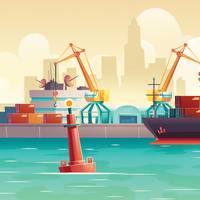
(This is excerpted from Maritime Reporter & Engineering News' January 2020 "The Path to Zero" column.)Are the world’s ships’ engines ready for IMO compliant very low sulfur fuel? That’s a wide open question as ship owners step to the end of the preparatory gang-plank on January 1, 2020 when 0.5% very low sulfur distillate fuels (VLSF) have to replace residual heavy fuel oil (HFO) containing 3.5% sulfur.You might think that given the length of time to prepare – since 2008 – shipping experts and engineers would have a clearer picture about new fuels and marine engines and operability.
Russia's Rosneft Tenders Marine Fuel Cargos in Euros
Top Russian oil producer Rosneft has put up marine fuel cargos for sale with the euro as the default currency, a tender document showed on Monday, in line with its plan to sell oil products in the single currency instead of the U.S. dollar.Rosneft said it had tendered to sell up to 70,000 tonnes of low-viscosity marine fuel with sulphur content of up to 1% from its oil refineries with delivery between Sept. 1 and Oct. 31 on a freight-on-board (FOB) Black Sea basis or FOB St Petersburg, or Carriage Paid To (CPT) any port/Russian border.The decision to switch to the euro as its settlement currency is likely to be seen as an attempt to offset any negative impact of U.S.
Guidance on 0.50% Sulphur Marine Fuel
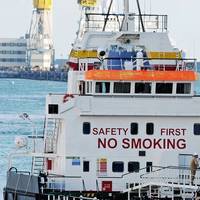
A number of shipping, refining, fuel supply and standards organisations have worked together to produce Joint Industry Guidance on the supply and use of 0.50% - sulphur marine fuel released on August 20, 2019.The publication has been developed by experts from across shipping, refining, supply and testing of marine fuels.The publication is designed to provide guidance for stakeholders across the marine fuels and shipping industries, from fuel blenders and suppliers to end users. It presents the specific safety and operational issues relating to the supply and use of max.
Ships Pass Dual-Fuel Methanol Milestone
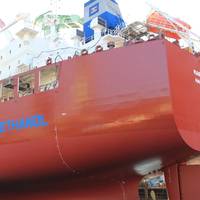
Marinvest, the Swedish ship-management company, has announced that its ‘Mari Jone’ and ‘Mari Boyle’, two of the first vessels powered by dual-fuel ME-LGI (-Liquid Gas Injection Methanol) engines operating on methanol, have each passed 10,000 operating hours on the alternative fuel. Additionally, the company reports that its combined ME-LGI-powered fleet has passed a cumulative total of 50,000 operating hours on methanol.The two methanol tankers are managed on timecharters for Waterfront Shipping and operate globally…
Brazil Court orders Petrobras to Refuel Iran Vessels

Brazil's top court on Thursday ordered state-run oil company Petroleo Brasileiro SA to refuel two Iranian grain vessels stranded on the Brazilian coast due to U.S. sanctions holding up sales of fuel needed for their return trips.Chief Justice Dias Toffoli overturned a lower court ruling that allowed Petrobras, as the oil major is known, to refrain from fueling the vessels.Petrobras had denied service, citing the risk of consequences from U.S. sanctions. However, the risk is reduced if it is simply obeying a Supreme Court ruling…
Iran Grain Ships Stranded in Brazil due to U.S. Sanctions
Two Iranian vessels have been stranded for weeks at Brazilian ports, unable to head back to Iran due to lack of fuel, which state-run oil firm Petrobras refuses to sell them due to sanctions imposed by the United States.The vessels Bavand and Termeh came to Brazil a couple months ago carrying urea, a petrochemical product used as fertilizer. They were expected to load corn and return to Iran, but lacked enough fuel for the trip, the port operator in Paranaguá told Reuters.Food is not covered by U.S. sanctions, and Iran is one of the largest buyers of Brazil's agricultural commodities, importing more than 2.5 million tonnes of Brazilian corn so far this year — more than any other country.However, that trade is not usually carried by ships flying the Iranian flag.
Marine Fuels: New Guidance for Low-Flashpoint Fuels
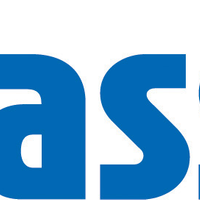
ClassNK has released Guidelines for Ships Using Low-Flashpoint Fuels (Methyl/Ethyl Alcohol / LPG).As the maritime industry is increasingly under regulatory mandate to reduce emissions, alternatives to diesel have been a focal point in recent years. These alternative fuels have lower flashpoints compared to traditional fuels, therefore particular attention needs to be given to ensuring adequate safety precautions when using low-flashpoint fuels in order to decrease the potential risk of fire and explosions that may arise as a result of fuel leakage onboard the ship.
Shipowners See Increase in IMO-Compliant Fuels, But Doubts Persist
Shipowners, who are facing one of the biggest changes in the oil industry in decades, are seeing more fuels that will be compliant with new rules on sulphur emissions from ships, but some say the way forward is far from clear.The United Nations shipping agency the International Maritime Organization (IMO) will from January 2020 limit the sulphur content in fuel ships use to 0.5%.With the exception of some zones around northwest Europe and North America known as Emission Control Areas where maximum sulphur content is restricted to 0.1% sulphur, the current global cap is 3.5%.The sulphur switch will be a mammoth task as it requires adapting the 300 million tonne a year bunker fuel market…
V.Group: Proactive Approach to 2020 Needed
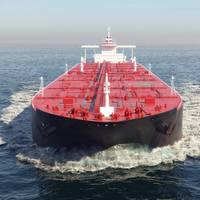
V.Group has urged shipowners and operators to take a proactive approach to 2020 compliance. With the global sulphur cap less than nine months away, V.Group is seeing growing numbers of shipowners and operators developing Ship Implementation Plans (SIPs) to mitigate risks and minimize disruption.It is predicted that most ships will burn ultra low sulphur fuel oils (ULSFOs) to comply with the suplhur cap legislation, switching from high sulphur fuel oil (HFO) to ULSFOs with a sulphur content at, or below, 0.50%, unless equipped with scrubbers.
IMO 2020: Shell, HES to Resurrect Refinery
Royal Dutch Shell has struck a deal with Dutch tank terminal firm HES International to partially restart a German oil refinery mothballed since 2011 in response to new restrictions on marine fuels, two trading sources told Reuters.A new cap set by the International Maritime Organization (IMO) that will cut the sulfur content in shipping fuel to 0.5 percent from 3.5 percent from next year is set to be one of the biggest fundamental events to hit oil markets in years.HES Wilhelmshaven Tank Terminal is in the process of reinstalling the vacuum distillation unit (VDU) at Wilhelmshaven to produce low-sulfur bunker fuels ahead of the implementation of the IMO rules…
BP Launches New Climate Compliant Marine Fuel for Shipping
Energy group BP is set to sell a new very low sulphur fuel oil (VLSFO) ahead of a ban on more polluting fuels for the shipping industry coming into force next year, it said on Monday."BP has developed a marine fuel offer that includes this new VLSFO along with marine gas oil and also high sulphur fuel oil for vessels that are equipped with scrubbers (sulphur filters)," it said."BP intends to retail the new 0.5 percent sulphur VLSFO globally."(Reuters, Reporting by Shadia Nasralla; Editing by Mark Potter)
Will Hydrogen Signal a Greater Use of Renewables?

Yaskawa Environmental Energy / The Switch believes the global maritime industry is now on the threshold of a committed move towards renewable energy, with hydrogen as the potential acid test in the shift away from fossil fuels.“Renewables and alternative fuels are attracting increasing interest, driven by greater environmental awareness within society, tighter regulations and an industry-wide need to optimize energy use and manage costs,” comments Asbjørn Halsebakke, Product Manager of Marine Drives, Yaskawa Environmental Energy/The Switch Norway.
First Diesel-Electric Damen Shoalbuster Ordered
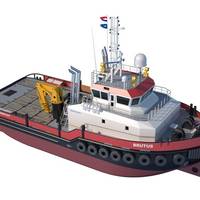
On January 25, 2019 the contract was signed between Damen Shipyards Hardinxveld (DSHa) and longstanding client Herman Sr. for the building of the first diesel-electric Damen Shoalbuster 3514 SD DP2. The new vessel is scheduled for delivery by the first half of 2020 and will be named Brutus. The Shoalbuster 3514 SD (shallow draft) DP2 (dynamic positioning 2) will be the first of a new Shoalbuster class and one of the largest and most sophisticated in the range, being also IMO Tier 3 compliant.The Shoalbuster 3514 will be a substantial and versatile working platform…


